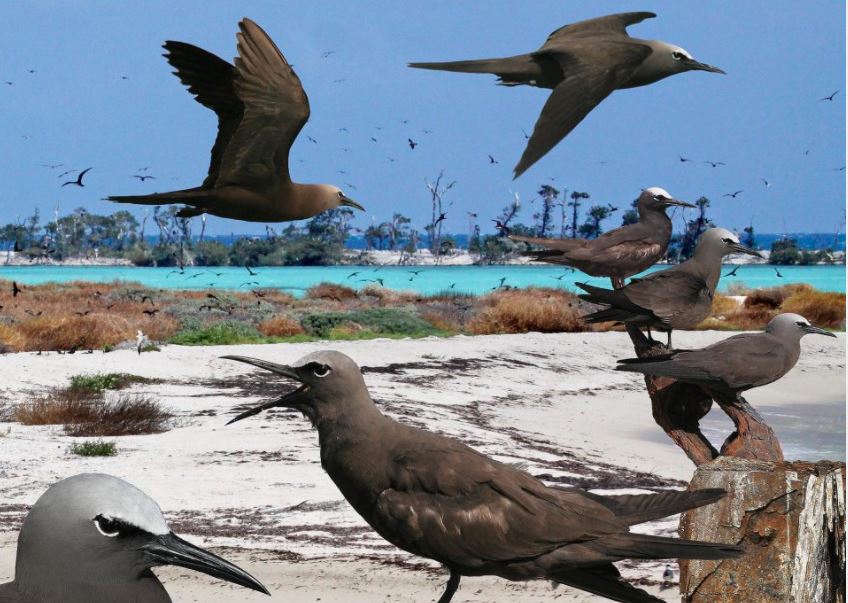An international team of researchers estimates that about half of the world's seabirds have ingested plastic additives after studying 145 seafowls of 32 species from 16 areas of the world.
Plastic chemicals such as brominated flame retardants and ultraviolet absorbers were found in 76 of these, including three from the waters of Awashima island in Niigata Prefecture, which was polluted at mild concentrations.
Ultraviolet absorbers are used to prevent the sunlight-induced degradation of plastics.
Their findings appeared in the English-language journal of the Japan Society for Environmental Chemistry in October.
In addition to the seabirds, chemicals used in plastic products to prevent them from deteriorating or catching fire have been found in other wildlife, including hermit crabs and humans.
Experts are calling for closer studies to be conducted on countermeasures against pollution by plastic additives, which even very small quantities could have adverse health effects.
The researchers were mainly from Japan and the US.



 FDA Adds Fatal Risk Warning to J&J and Legend Biotech’s Carvykti Cancer Therapy
FDA Adds Fatal Risk Warning to J&J and Legend Biotech’s Carvykti Cancer Therapy  Dow Hits 50,000 as U.S. Stocks Stage Strong Rebound Amid AI Volatility
Dow Hits 50,000 as U.S. Stocks Stage Strong Rebound Amid AI Volatility  South Africa Eyes ECB Repo Lines as Inflation Eases and Rate Cuts Loom
South Africa Eyes ECB Repo Lines as Inflation Eases and Rate Cuts Loom  Wildfires ignite infection risks, by weakening the body’s immune defences and spreading bugs in smoke
Wildfires ignite infection risks, by weakening the body’s immune defences and spreading bugs in smoke  Thailand Inflation Remains Negative for 10th Straight Month in January
Thailand Inflation Remains Negative for 10th Straight Month in January  Drug pollution in water is making salmon take more risks – new research
Drug pollution in water is making salmon take more risks – new research  China Extends Gold Buying Streak as Reserves Surge Despite Volatile Prices
China Extends Gold Buying Streak as Reserves Surge Despite Volatile Prices  Senate Sets December 8 Vote on Trump’s NASA Nominee Jared Isaacman
Senate Sets December 8 Vote on Trump’s NASA Nominee Jared Isaacman  GesiaPlatform Launches Carbon-Neutral Lifestyle App ‘Net Zero Heroes’
GesiaPlatform Launches Carbon-Neutral Lifestyle App ‘Net Zero Heroes’  Trump Lifts 25% Tariff on Indian Goods in Strategic U.S.–India Trade and Energy Deal
Trump Lifts 25% Tariff on Indian Goods in Strategic U.S.–India Trade and Energy Deal  Singapore Budget 2026 Set for Fiscal Prudence as Growth Remains Resilient
Singapore Budget 2026 Set for Fiscal Prudence as Growth Remains Resilient  Eli Lilly’s Inluriyo Gains FDA Approval for Advanced Breast Cancer Treatment
Eli Lilly’s Inluriyo Gains FDA Approval for Advanced Breast Cancer Treatment  SpaceX Starship Explodes in Texas During Test, Citing Nitrogen Tank Failure
SpaceX Starship Explodes in Texas During Test, Citing Nitrogen Tank Failure  SpaceX Prioritizes Moon Mission Before Mars as Starship Development Accelerates
SpaceX Prioritizes Moon Mission Before Mars as Starship Development Accelerates  We combed through old botanical surveys to track how plants on Australia’s islands are changing
We combed through old botanical surveys to track how plants on Australia’s islands are changing 































